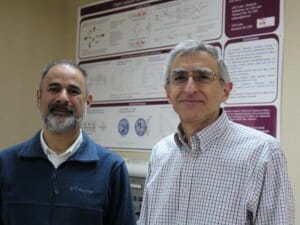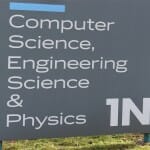Animator Hayao Miyazaki once said, “…Engineers turn dreams into reality.”
The College of Staten Island (CSI) is proud to be a part of that reality by introducing a Master of Engineering in Electrical Engineering (MEEE) Program at the College. The Program is currently accepting applicants for its debut in Fall 2017. CSI joins only one other City University of New York (CUNY) school, City College of New York (CCNY), which offers the degree.
“This Program will provide a foundation across all areas of electrical engineering,” noted Program Director Mark D. Feuer, PhD, who co-wrote the MEEE Program proposal with Vinay Vaishampayan, PhD. “But we also want it to broaden existing CUNY offerings, so we included lab courses and curriculum supporting data infrastructure and analysis.”
The 30-credit program has two optional specializations: Photonic Systems and Networks or Information Processing and Transmission.
“We chose these two specializations to complement what is already available at CCNY and also to contribute to our data-driven economy,” said Dr. Feuer, who is also the Preceptor for Photonic Systems and Networks. “Our graduates are working in industries where the end product is not necessarily electrical engineering.”
“The traditional view of electrical engineering is that it is only about electrical machines and electric power. While those traditional applications are extremely important, a lesser-known side of electrical engineers is that they work with computers and algorithms and that many of the techniques that are popular in machine learning and `big-data’ analytics, have been known and used in the electrical engineering sub-field of signal processing for years,” added Dr. Vaishampayan, who is Preceptor for Information Processing and Transmission. “A rigorous training in electrical engineering is extremely relevant and valuable for work in data analytics, and graduates from the MEEE Program can work in a range of data-driven fields, including finance and advertising.”
Feuer and Vaishampayan both previously worked at AT&T and taught at Columbia University. They began at CSI in 2013 and 2014, respectively.
“The industry experience informs us on what’s valuable outside. Hopefully, this Program will capture the best of both worlds: the academic side and the industry side,” said Dr. Vaishampayan.
Inspired by preliminary work by Syed Rizvi, PhD; Neophytos (Neo) Antoniades, PhD; and Alfred Levine, PhD, the official proposal was vetted by CSI faculty, reviewed by CUNY and external experts, and finally approved by the New York State Education Department.
“This was an amazingly smooth process, and we received tremendous support from President [William J.] Fritz and Provost [Gary] Reichard. They really helped to put a lot of energy into this,” noted Dr. Vaishampayan.
The MEEE can be a terminal degree, and also prepares students for the PhD in Electrical Engineering at CCNY. The Program will be accessible to full- and part-time students.
“The MEEE will offer tremendous opportunities for employment to our students in many high-tech industry sectors in the metro region as well as nationwide, and is a great supplement to our high-caliber, ABET-accredited undergraduate Engineering programs at the Department,” commented Dr. Antoniades, PhD, noting that there are currently about 600 students enrolled in programs at the Department of Engineering Science and Physics.
Dr. Feuer is confident that CSI students will be up for the challenges of the new graduate degree.
“Our Engineering students at CSI are committed, and we work them very hard. They have to master the mathematics and the technology, and they really throw themselves into the subject,” said Dr. Feuer, adding that the Engineering students are “truly ambitious” in their pursuit of hands-on, practical work after graduating.
To apply to the MEEE Program, visit the CSI Graduate Admissions Web site or contact Sasha Spence at sasha.spence@csi.cuny.edu.




![[gallery] A Student’s Journal from the U.S. Virgin Islands](https://csitoday.com/wp-content/uploads/2011/10/orbweaver_spider_100211.jpg)

![[gallery] Fourth Annual Savor the Flavors Raises Funds for CSI Students](https://csitoday.com/wp-content/uploads/2013/04/savor-the-flavor-2013-best-dish.jpg)










